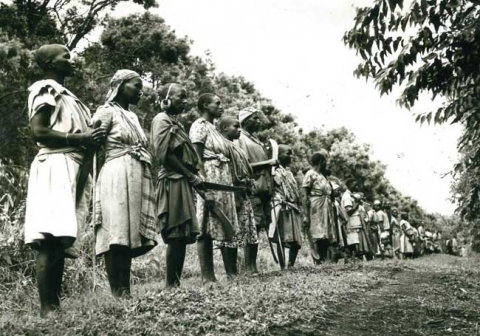
A former primary school teacher, a dairy and timber clerk, a pig farmhand with a missing left index finger, a trader in hides and an admired but violent thief, was hanged on February 18, 1957. That man was Field Marshall Dedan Kimathi. He spoke in parables and quoted the Old Testament Kikuyu Bible he carried and borrowed the British military hierarchy for his rat tag forest militia.
The Mau Mau army had had field marshalls, like Field Marshall Musa Mwariama who was at the helm with Kimathi. Next came the generals like Baimungi, General Mathenge, General China, General Chui, General Kago, General Kimbo and General Kahiu Itina.
The army was governed by two key councils: The Nyandarua Defence Council formulated policy and appointed gang heads; while the Gikuyu na Mumbi Itungati Association (The Gikuyu and Mumbi Welfare Association) led the war effort, planning raids, tactics, assaults and targets using guns fashioned from odd scraps of iron pipes, bolts, rubber bands and bits of wire, while running over 100 kilometres through the forest barefoot in a single day.
They knew there was little to fear as Kimathi had uncanny ability in sensing and escaping danger. Desertion equalled death in the forest.
But did you know that long before any street, estate, high school, university and a monument (several inches shy of his actual height) were named after him, Field Marshall Dedan Kimathi had bestowed upon himself the title KCAE (meaning Knight Commander of the African Empire) in a forest ceremony?
Well, that is according to colonial policeman, Ian Henderson, in Manhunt in Kenya, Philip Goodhart’s 1958 account of how Henderson employed Mau Mau turncoats to betray, track and capture Kimathi who was tried and hanged in October 1957.
Manhunt in Kenya, slight colonial soot and all, paints a disturbingly variegated picture of Kimathi, the freedom, hero nicknamed ‘Njangu’ (rough and treacherous) for his proficiency in the violence department.
Henderson, who died in Bahrain in April 2013 aged 86, also noted that dissenters in Kimathi’s army were “strangled with a rope and left for the hyenas to eat.” Even his brothers, Wambararia and Wagura (from the same mother but different fathers), were not spared being smothered in the cusp of his authoritative armpit.
Did you also know that ‘Prime Minister Sir Dedan Kimathi,’ as he called himself, enjoyed creature comforts like a wooden bed, new clothes and medicine, and was guarded by 60-plus handpicked Mau Mau devotees?
For relaxation, traditional dances were on the cards from “young Kikuyu girls abducted from the Kikuyu reserve.”
Among Kimathi’s raft of decrees was that no one bedded Mau Mau girls - without permission - if one was not a Field Marshall or General!
But this life of forested luxury while fighting for freedom dwindled in scale as more Mau Mau fighters were captured by the colonial army, police and home guards. “The ‘passive wing’ of Mau Mau in reserves, towns and farms were broken by imperial forces, gradually thinning supplies of information, arms, food, clothing and medicine to the military wing’ in the forests.”
Home guard police who were dubbed Ndirangu, shot Kimathi thrice, missing twice, before they found their target in his leopard skin coat and dreadlocks.
 The Standard Group Plc is a multi-media organization with investments in media
platforms spanning newspaper print
operations, television, radio broadcasting, digital and online services. The
Standard Group is recognized as a
leading multi-media house in Kenya with a key influence in matters of national and
international interest.
The Standard Group Plc is a multi-media organization with investments in media
platforms spanning newspaper print
operations, television, radio broadcasting, digital and online services. The
Standard Group is recognized as a
leading multi-media house in Kenya with a key influence in matters of national and
international interest.
